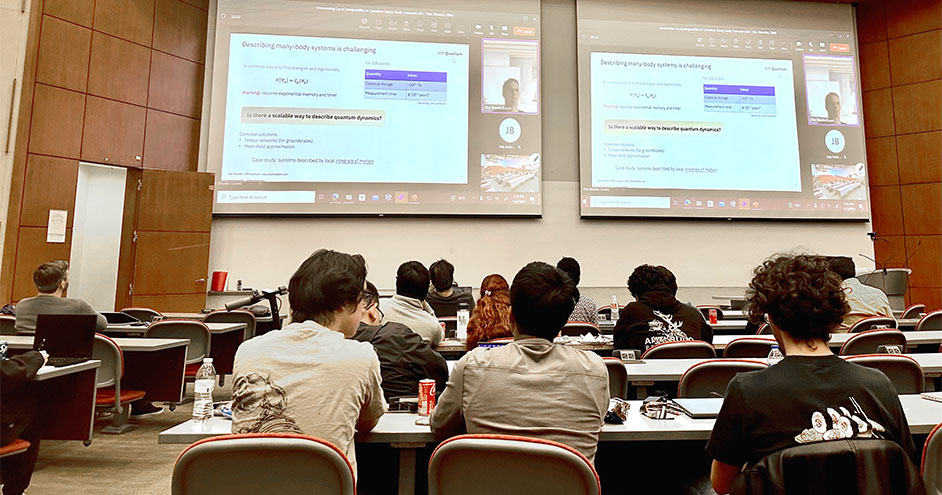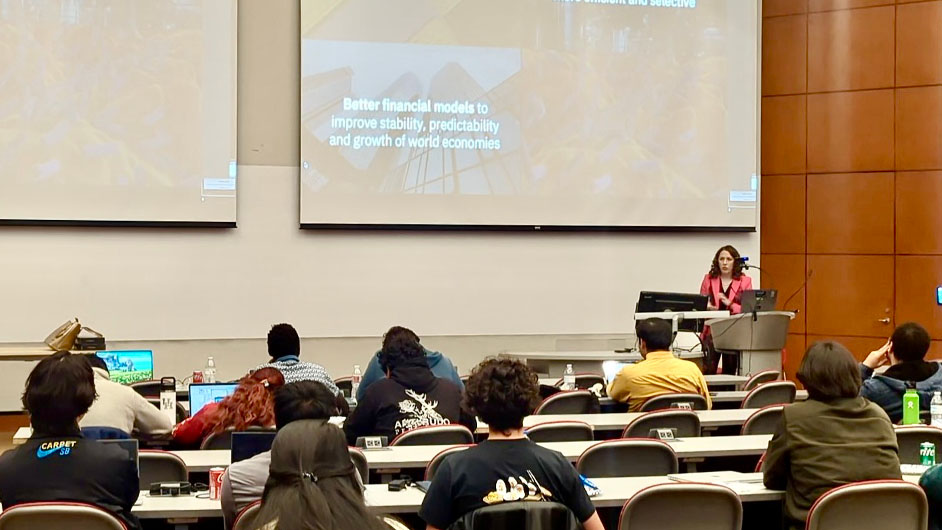Collaboration with IBM Positions UH as a Leader in New Computing Field
As technology evolves, quantum computing stands out as a force that promises to reshape the way we process information and tackle complex problems.

The University of Houston is making strides in the realm of quantum computing through student opportunities, faculty development and research.
The Quantum Computing Fall Fest at UH, held over three days in November, supported this effort.
The festival, held for the first time at UH, was open exclusively to undergraduate and graduate students. The event, organized by UH physics Ph.D. student Sameer Dambal and American Physical Society at UH president and physics Ph.D. student Rutik Manikandhan, featured talks from quantum computing experts around the country. It also introduced students to IBM’s Qiskit quantum software development kit, which gave students opportunities to compete by building algorithms.
Support for the festival was made possible through funding from UH’s College of Natural Sciences and Mathematics and the Departments of Computer Science, Mathematics and Physics.
The American Physical Society chapter at UH, Code Coogs and the Women in Physics Society at UH also contributed to the event’s success.
Putting UH on the Map for Quantum Computing
The Quantum Computing Fall Fest at UH was part of the network of global events connected to IBM’s Qiskit Fall Fest, an event that featured quantum computing events on college campuses around the world.

UH was the only Houston-area university chosen by IBM as a partner institution for the 2023 Qiskit Fall Fest and one of only three Texas universities organizing Qiskit events. Organizers at UH participated in a global application process for the collaboration with IBM.
“Every year, IBM reaches out to students around the world with an opportunity to collaborate for this event on a local level,” said Dambal. “The purpose is to educate the student community about quantum computing.”
IBM offers large-scale and small-scale options for local festivals, making a unique experience for each college campus.
“Categories include small-scale extension events for intimate group discussions and instruction, as well as partner events that are determined by the skillset and ability of a campus to hold a large-scale event with multiple sessions,” said Dambal.
Several factors made it possible for UH to host the event.
“UH has a strong network of undergraduate and graduate programs. Participants in these groups provided the support we needed to make this inaugural event successful,” said Manikandhan.
UH was chosen from a large pool of global applicants based on its ability to host a large-scale event. Only 34 universities from around the world were selected by IBM.
“Quantum computing has grown rapidly in the last few years, and it is important to make it accessible for everyone,” said Pablo Lopez-Duque, a UH physics Ph.D. student who helped attract speakers to the event. “We contacted many experts in the field and are glad that students were able to learn about the basics of quantum computing, current research topics and career opportunities from them.”
Lopez-Duque recently earned a fellowship from UH’s Center for Mexican American and Latino/a Studies to develop a quantum computing education program.
More Quantum Computing Opportunities for Students
The festival gave students opportunities to work alongside IBM to design and plan individual events that ranged from technical hackathons for experts to hackathons for beginners.
Guest speakers at the festival included:
- Clarice Aiello, CEO of Quantum Biology Tech (QuBiT) Lab
- Jody Burks, IBM account technical leader for ExxonMobil and central U.S. regional lead for IBM Quantum Ambassadors
- Abhijit Chakraborty, UH alumnus and postdoctoral fellow at the Institute for Quantum Computing at the University of Waterloo
- Avadh Saxena, group leader of the Condensed Matter and Complex Systems Group at Los Alamos National Lab
- Oles Shtanko, research scientist at IBM Quantum
The competition held as part of the festival was based on Challenge notebooks provided by IBM that are meant to provide the basics about how to program a quantum computer.
Competition winners were physics Ph.D. students Gustavo Valdivia, Ryan Boyce and Aymen Shamoon, atmospheric science Ph.D. student Deveshwar Singh and chemistry graduate student Kusalvin Dabare.
Plans are already in development to host the event again next year at UH.
“We will need to apply again for next year’s event,” said Dambal. “Now that we have an established partnership with IBM, we believe this will make the process much more streamlined.”
- Chris Guillory, College of Natural Sciences and Mathematics